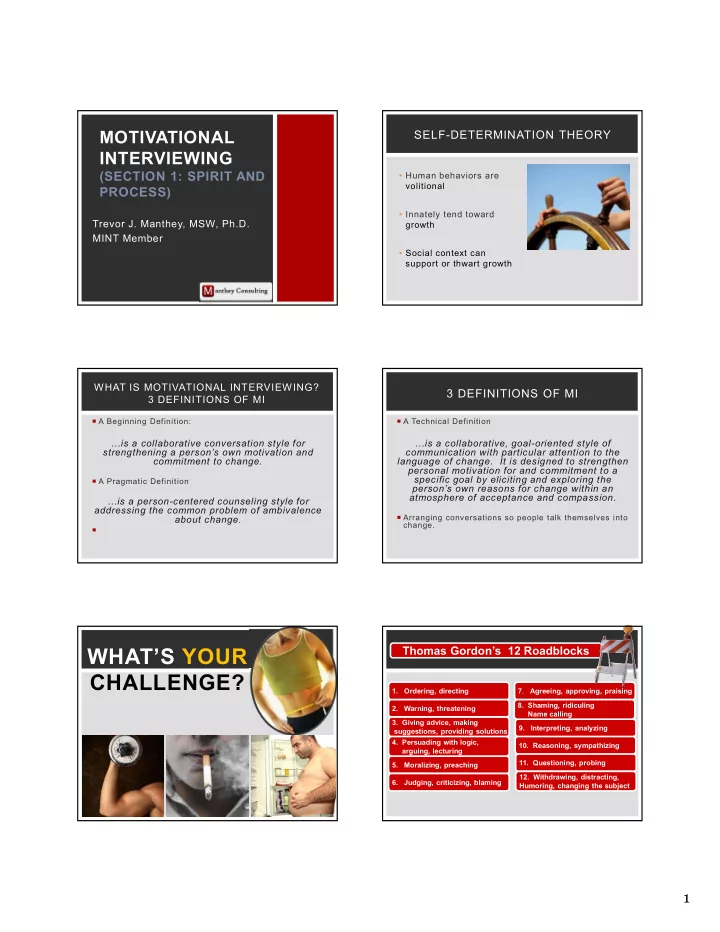

MOTIVATIONAL SELF-DETERMINATION THEORY INTERVIEWING (SECTION 1: SPIRIT AND • Human behaviors are volitional PROCESS) • Innately tend toward Trevor J. Manthey, MSW, Ph.D. growth MINT Member • Social context can support or thwart growth WHAT IS MOTIVATIONAL INTERVIEWING? 3 DEFINITIONS OF MI 3 DEFINITIONS OF MI A Beginning Definition: A Technical Definition …is a collaborative conversation style for …is a collaborative, goal-oriented style of strengthening a person’s own motivation and communication with particular attention to the commitment to change. language of change. It is designed to strengthen personal motivation for and commitment to a specific goal by eliciting and exploring the A Pragmatic Definition person’s own reasons for change within an atmosphere of acceptance and compassion. …is a person-centered counseling style for addressing the common problem of ambivalence Arranging conversations so people talk themselves into about change . change. WHAT’S YOUR Thomas Gordon’s 12 Roadblocks CHALLENGE? 1. Ordering, directing 7 . Agreeing, approving, praising 8. Shaming, ridiculing 2. Warning, threatening Name calling 3. Giving advice, making 9. Interpreting, analyzing suggestions, providing solutions 4. Persuading with logic, 10. Reasoning, sympathizing arguing, lecturing 11. Questioning, probing 5. Moralizing, preaching 12. Withdrawing, distracting, 6. Judging, criticizing, blaming Humoring, changing the subject 1
THE RIGHTING REFLEX THE SPIRIT OF MI We must resist the “righting influence” artnership Why don’t you want to make a change? How can you tell me you don’t have a problem? cceptance What makes you think you are not at risk? Why don’t you just... absolute worth accurate empathy Why can’t you... autonomy support affirmation ompassion Why doesn’t this approach work? It causes the two people to actually act out the vocation “sustain” side of their ambivalence! MI ASSUMPTIONS Ambivalence about change is normal. MI is not done “to” or “on” someone at all. MI is done “for” and “with” a person. Miller and Rollinick, MI3 Ambivalence can be resolved by working with intrinsic motivations and values. AMPLIFIED AMBIVALENCE GENERAL PRINCIPLES R oll With Resistance ( Dancing with Discord ) E xpress Empathy Reasons not Reasons for to change change D evelop Discrepancy ( Amplify Ambivalence) S upport Self-Efficacy 2
THE FOUR PROCESSES OF MI THE FOUR PROCESSES OF MI IV: PLAN Process I: Process II: Process III: Process IV: ENGAGE FOCUS EVOKE III: EVOKE PLAN II: FOCUS I: ENGAGE FOUR TYPES OF LANGUAGE Discord Sustain Change Commitment (Resistance) Talk Talk Talk Emotionally Based The No-Change Side The Change Side Resolve and Of Ambivalence of Ambivalence Readiness Relationally Oriented Response Response Response Response Rescue Change Elicit More Begin Planning (Re)Engage with Talk! Change Talk! Process! Empathic Reflections! Engage Evoke Evoke Plan (Re)Focus O PEN-ENDED QUESTIONS… O.A.R.S. O pen-ended questions • Do not invite brief answers A ffirmations • Encourage or “elicit” more productive talk R eflections S ummary Statements • Client should do more than half of the talking. The foundational “Micro • Do not ask more than 3 questions in a row. Skills” of MI • MI “competency”: 3 open Q’s to 1 closed. These skills are used differently in each MI process 3
R EFLECTIVE LISTENING In ordinary counseling sessions: questions often outnumber reflections by a ratio of 10Q:1R Moving past what has already been said without moving too far ahead will keep reflective listening from going in circles Counselors “competent” in Reflection is not a passive process Motivational Interviewing: 1Q:2R Counselor chooses what to respond to and what to ignore “Even though nothing has happened, I’ve been feeling more depressed lately. I just don’t want to get out of bed or make phone calls.” Simple Repeating an element of “You’ve been more what the speaker has said depressed lately.” Reflection Staying close to what the “So your sadness is getting speaker has said with some worse and you don’t know synonyms why.” Complex Inferring/guessing at the “You are having a hard time speaker’s meaning and and want to understand why Reflection reflecting it back you keep sliding back into depression.” Emphasizing the emotional “Its like a heavy cloud that dimension through sucks your energy.” feeling/metaphors SUSTAIN TALK SUMMARIZING Desire for Status Quo Collecting Inability to Change Gathering together what the client has said Reason for Status Quo Linking Need for Status Quo Making connections C ommitment to Status Quo Transitional Preparing to shift focus NO BEHAVIOR CHANGE 4
WHEN ARE PEOPLE MOTIVATED TO PARADOX TAKE STEPS TOWARD CHANGE? Confidence Importance “ACCEPTANCE FACILITATES CHANGE, WHILE Specific Behavior Recognition of PERCEIVED EXPECTATION OF CHANGE Problem / Need Global Efficacy GENERATES RESISTANCE” Cost / Benefit Commitment PEOPLE ARE OFTEN MORE PERSUADED Expectancies BY WHAT THEY HEAR THEMSELVES SAY Intention THAN BY WHAT OTHER PEOPLE TELL Goals Values THEM . CHANGE TALK CHANGE TALK Desire for Change Ability to Change DESIRE for Change: “I want to…” ABILITY for Change: “I could…” Reason to Change REASONS for Change: “I should…” NEED for Change: “I have to…” Need for Change C ommitment to Change Activation Work with these to strengthen T aking small steps COMMITMENT to Change: “I will…” BEHAVIOR CHANGE RESPONDING TO CHANGE TALK “Early in the MI session the skill is often to discern a ray of change talk, like E : Elaboration spotting a lighthouse Ask for elaboration, more detail, in what ways, specific examples in a storm or detecting A : Affirm a signal within noise. Express appreciation or admiration R : Reflection It is not necessary to eliminate the Simple, Complex storm or the noise , S : Summarize just follow the signal.” Collect and focus the change talk Miller and Rollnick 2012 5
ELICITING CHANGE TALK: LEARNING NEW COUNSELING SKILLS MI BECOMES DIRECTIVE I mportance/Confidence Ruler Q uerying Extremes “One reason it is possible to keep on learning and improving one’s skills in Motivational Interviewing L ooking Back / Looking Forward is that immediate expert feedback is continuously available. It is available from those you serve.” E vocative Questions D ecisional Balance Motivational Interviewing – p. 180 G oals and Values 6
Recommend
More recommend